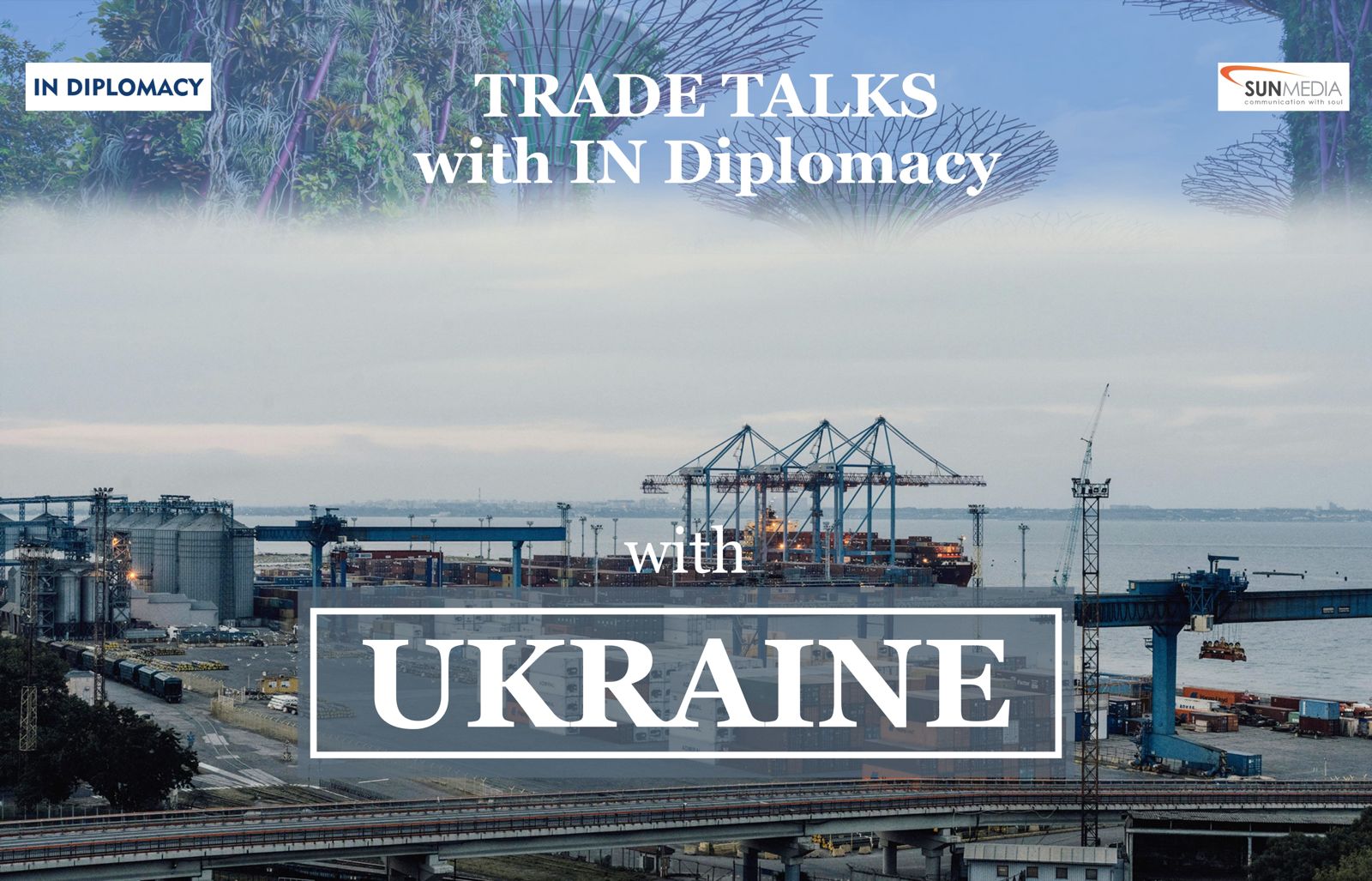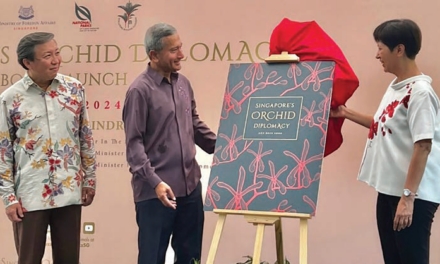
In an exclusive interview with IN Diplomacy, Ambassador Kateryna Zelenko highlights Ukraine’s resilient economy, evolving trade framework, and potential for Singaporean partnerships.

Singapore, 8 May 2025 – As part of IN Diplomacy‘s Trade Talk Series, Her Excellency Kateryna Zelenko, Ambassador of Ukraine to Singapore, offered in-depth insights into Ukraine’s current business environment and trade potential in an exclusive interview.
How does your country rank in terms of ease of doing business and trade?
The current landscape of Ukraine reflects a nation in transformation, driven by the ongoing reforms and resilience amidst challenges. Despite the backdrop of the conflict, Ukraine’s economy continues to evolve, with notable advancements in sectors like agriculture and IT. The export success in grain, sunflower oil, along with innovative services underscore Ukraine’s growing role in global markets. Moreover, improvements in business indicators such as ease of starting a business as well as investor protection mechanisms, signal a positive trajectory for entrepreneurship and foreign investment. As Ukraine navigates its path towards the EU membership, these developments lay a promising foundation for future economic growth and prosperity.
A rank of 61 out of 190 suggests that Ukraine offers a moderately favorable environment for entrepreneurs to initiate new business ventures. Factors influencing this ranking could include time, procedures, and costs involved in registering a business, obtaining necessary permits, and complying with regulatory requirements. To a large extent, this was facilitated by the launch of the digital Diia service, which simplified many procedures for filing documents
What are the advantages and challenges of trading with Ukraine?
The Ukrainian government has addressed the unnecessary trade barriers that encumber trade, to make the business environment simpler and more transparent for local and foreign companies. Although Ukraine zeroed its compulsory certification lists, its certification system remains in place. The certification system is based on the Law on Standards, Technical Requirements and Compliance Evaluation Procedures, Law on Standardization, Law on Conformity Certification.
Ukraine has passed several new laws and governmental decrees in recent years aimed at bringing Ukrainian practices in this area into line with the WTO Agreement on Technical Barriers to Trade (TBT). As part of the EU-Ukraine Deep and Comprehensive Free Trade Agreement (DCFTA) Ukraine began approximating its standards to the EU in 2016 introducing respective legislative amendments.
Are there any particular regulations or compliance requirements for importing or exporting to and from your country?
Technical regulations in Ukraine are coordinated by the Department for Technical Regulations of the Ministry of Economy of Ukraine and developed by the State Enterprise Ukrainian Scientific, Research and Training Center for Certification, Standards, and Quality (SE “UkrNDNC) which serves as a national standardization body. Enforcement of the quality of products and their compliance with the national standards is done by the State Inspection for Food Safety and Consumer Protection. Certification is a fee-based service in Ukraine. This certification service is delegated to about 100 accredited certification agencies listed at the National Accreditation Agency of Ukraine.
As importer, or its Ukrainian trading partner, you are free to choose one of the accredited certification agencies and order a product certification needed for sale or production use of products in Ukraine. Depending on the type of product, testing, and applicable certification scheme, the certification process can take up to 30 days.

Who are your country’s leading global trading partners, and what are the primary commodities or products exchanged between your country and international markets?
Despite persistently weak price trends for Ukraine’s key export commodities, in 2024 its exports increased by 15% in terms of value and over 30% in terms of volume. This marks a significant improvement compared to 2023, when foreign sales dropped by nearly 20%. The opening of the new Black Sea corridor in September 2023 contributed to these improved results, making it possible to return to transporting all commodities, rather than just agricultural produce. This resulted, for instance, in a nearly twofold increase in iron ore exports and the identification of alternative markets within the EU for Ukrainian grain. The EU has continued to be Ukraine’s primary export market, which is nearly 60% of total exports. While exports to the EU grew by 6% year-on-year in 2024, significantly higher growth rates were recorded for other regions: the Middle East (up 25% y/y), Southeast Asia (up 31% y/y) and other states (up 42% y/y).
Ukraine’s exports are dominated by agri-food products which in 2024 accounted for nearly 60% of total foreign goods sales, valued at $25 billion (up 12% y/y). The primary exports included sunflower oil, corn, wheat, rapeseed and soybeans. In 2024, Ukraine recorded its highest volume of sugar exports in 27 years, reaching 750,000 tonnes, a 45% increase y/y.
In 2024, the value of Ukraine’s imports was $71 billion, an increase of 11% compared to 2023. The EU was Ukraine’s largest supplier, accounting for 50% of its imports. Ukraine’s main trade partners included China (20% of imports), Poland (9.9%), and Germany (7.6%). Fuels, cars, trucks, medicines, telecommunication equipment remain the most significant imports as this trend is much related to the ongoing Russia’s aggression.

What measures can foreign companies take to understand effectively and navigate your country’s regulatory landscape?
Technical regulations in Ukraine are coordinated by the Ministry of Economy of Ukraine, which oversees the country’s quality infrastructure, including standardization, technical regulation, conformity assessment, accreditation, and metrology. Importers seeking detailed information can refer to several key resources: the Ministry of Economy’s official documents portal (https://me.gov.ua/Documents/), the Technical Regulations Register maintained by the Ukrainian Center for Public Safety (https://ucps.com.ua/en/technical-regulations-register), the State Service of Ukraine on Food Safety and Consumer Protection (https://dpss.gov.ua/en), and the State Service of Ukraine on Medicines and Drugs Control (https://www.dls.gov.ua/en/). Additionally, information on public procurement procedures can be accessed via the ProZorro Public Procurement system (https://prozorro.gov.ua/en).
What are the key Ukrainian goods that present tariff and cost advantages for Singapore’s importers under existing or future trade agreements?
Ukraine and Singapore trade relations are gradually growing based on common aim to extend the diversification of supplies and strengthen the Singapore’s food security. We are growing from strength to strength in agriculture and tech, exploring new fields of cooperation. Ukraine will further remain a reliable exporter of high-quality products to the Singaporean market and is ready to increase its supplies of table eggs, wheat and barley, vegetable oils and meat, including the supply of pork and pork products to the Singapore’s market in near future.
Ukrainian companies are ready to promote their supplies of cereals, cheese, confectionery, fruit and vegetable juices, wine and beer, as well as services and cooperation on the Singaporean market of IT/AI and financial technologies.
In what ways can the embassy assist Singaporean companies interested in establishing trade with Ukraine?
The activities of the Embassy of Ukraine in Singapore in building trade and economic cooperation are supported by the international platform NAZOVNI, an integral part of the Ministry of Foreign Affairs of Ukraine dedicated to promoting Ukrainian exports. This platform is also useful for importers from any country seeking supplies from Ukraine. Ukrainian diplomats can assist non-resident companies interested in purchasing products or services from Ukrainian suppliers. Foreign companies can download and explore the most up-to-date Catalog of Ukrainian Goods for Export on the Embassy’s website and through the following platforms: NAZOVNI Online (https://nazovni.online/en) and Diia Business (https://export.gov.ua/).
Which types of products from your country are you currently seeking to expand into new international markets?
The following export product groups represented the highest dollar value in Ukraine’s global shipments during 2024 and remain key targets for further expansion: cereals (23%), animal/vegetable fats, oils, and waxes (14%), oil seeds (8%), iron and steel (8%), ores and slag (7%), electrical machinery and equipment (4%), animal fodder (4%), wood (4%), meat (3%), and articles of iron or steel (2%).
















